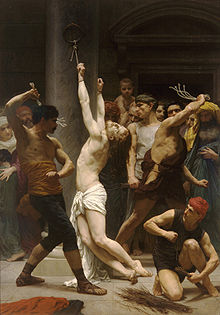"Mass movements can rise and spread without belief in a God, but never without belief in a devil."
(Alan: Canadian Prime Minister, Brian Mulroney, seconded Hoffer's observation: "In politics, Madame, you need two things: friends, but above all an enemy.")
(Alan: Canadian Prime Minister, Brian Mulroney, seconded Hoffer's observation: "In politics, Madame, you need two things: friends, but above all an enemy.")
"The less justified a man is in claiming excellence for his own self, the more ready he is to claim all excellence for his nation, his religion, his race or his holy cause."
"Faith in a holy cause is to a considerable extent a substitute for the lost faith in ourselves."
"The opposite of the religious fanatic is not the fanatical atheist but the gentle cynic who cares not whether there is a god or not."
"It is startling to realize how much unbelief is necessary to make belief possible. What we know as blind faith is sustained by innumerable unbeliefs."
Eric Hoffer Wikiquotes
***

***

Free men are aware of the imperfection inherent in human affairs, and they are willing to fight and die for that which is not perfect. … The rejection of approximations and the insistence on absolutes are the manifestation of a nihilism that loathes freedom, tolerance, and equity.
***

You accept certain unlovely things about yourself and manage to live with them. The atonement for such an acceptance is that you make allowances for others — that you cleanse yourself of the sin of self-righteousness.
***

Good and evil grow up together and are bound in an equilibrium that cannot be sundered. The most we can do is try to tilt the equilibrium toward the good.

If it is to survive, a just society must be strong and resolute enough to deal swiftly and relentlessly with those who would mistake its good will for weakness.
***

It is doubtful if the oppressed ever fight for freedom. They fight for pride and power— power to oppress others.
***

Compassion is probably the only antitoxin of the soul. Where there is compassion even the most poisonous impulses remain relatively harmless.
***
***

The awareness of their individual blemishes and shortcomings inclines the frustrated to detect ill will and meanness in their fellow men.
***

True loyalty between individuals is possible only in a loose and relatively free society.
***

The autonomous individual, striving to realize himself and prove his worth, has created all that is great in literature, art, music, science and technology. The autonomous individual, also, when he can neither realize himself nor justify his existence by his own efforts, is a breeding call of frustration, and the seed of the convulsions which shake our world to its foundations.
Alan: The quotation above is lopsided overstatement. See "Follow-up exchange with Fred Owens" at bottom of "Why Rugged Individualism Is Toxic For Technological Development" - http://paxonbothhouses.blogspot.com/2013/08/why-rugged-individualism-is-toxic-for.html
In defense of overstatement, consider Hoffer's observations: "To think out a problem is not unlike drawing a caricature. You have to exaggerate the salient point and leave out that which is not typical. "To illustrate a principle," says Bagehot, "you must exaggerate much and you must omit much." As to the quantity of absolute truth in a thought: it seems to me the more comprehensive and unobjectionable a thought becomes, the more clumsy and unexciting it gets. I like half-truths of a certain kind — they are interesting and they stimulate." "It is the Frenchman's readiness to exaggerate that is at the root of his intellectual lucidity and also of his capacity for acknowledging merit. The English were not afraid to exaggerate in the sixteenth and seventeenth centuries, and they were then not far behind the French in the lucidity of their thinking.... There is hardly a single instance of cultural vigor marked by moderation in expression."
"Notice how well the following caricatures work.
Gun Cartoons and Gun Violence Bibliograph"
http://paxonbothhouses.blogspot.com/2012/07/gun-cartoons-and-gun-violence.html
In defense of overstatement, consider Hoffer's observations: "To think out a problem is not unlike drawing a caricature. You have to exaggerate the salient point and leave out that which is not typical. "To illustrate a principle," says Bagehot, "you must exaggerate much and you must omit much." As to the quantity of absolute truth in a thought: it seems to me the more comprehensive and unobjectionable a thought becomes, the more clumsy and unexciting it gets. I like half-truths of a certain kind — they are interesting and they stimulate." "It is the Frenchman's readiness to exaggerate that is at the root of his intellectual lucidity and also of his capacity for acknowledging merit. The English were not afraid to exaggerate in the sixteenth and seventeenth centuries, and they were then not far behind the French in the lucidity of their thinking.... There is hardly a single instance of cultural vigor marked by moderation in expression."
"Notice how well the following caricatures work.
Gun Cartoons and Gun Violence Bibliograph"
http://paxonbothhouses.blogspot.com/2012/07/gun-cartoons-and-gun-violence.html
***

It has often been said that power corrupts. But it is perhaps equally important to realize that weakness, too, corrupts. Power corrupts the few, while weakness corrupts the many. Hatred, malice, rudeness, intolerance, and suspicion are the faults of weakness.
***

Absolute power corrupts even when exercised for humane purposes. The benevolent despot who sees himself as a shepherd of the people still demands from others the submissiveness of sheep. The taint inherent in absolute power is not its inhumanity but its anti-humanity.
***

The fanatical believer is not conscious of his envy, malice, pettiness and dishonesty. There is a wall of words between his consciousness and his real self.
***

The real "haves" are they who can acquire freedom, self-confidence, and even riches without depriving others of them. They acquire all of these by developing and applying their potentialities.
***

There are many who find a good alibi far more attractive than an achievement.
***
***
Some of the worst tyrannies of our day genuinely are "vowed" to the service of mankind, yet can function only by pitting neighbor against neighbor. The all-seeing eye of a totalitarian regime is usually the watchful eye of the next-door neighbor.
***
Not only does the intellectual's penchant for tutoring, directing, and regulating promote a regimented social pattern, but his craving for the momentous is bound to foster an austere seriousness inhospitable to the full play of freedom.
***
In an adequate social order, the untalented should be able to acquire a sense of usefulness and of growth without interfering with the development of talent around them.
***
***
People unfit for freedom — who cannot do much with it — are hungry for power. The desire for freedom... says: leave me alone and I shall grow, learn, and realize my capacities. … Freedom gives us a chance to realize our human and individual uniqueness.
***

A profound thought is an exciting thing — as exciting as a detective's deductions or hunches. The simpler the words in which a thought is expressed the more stimulating its effect.
***

I am more and more convinced that taking life over-seriously is a frivolous thing.
(Alan: Perhaps life - and its fundamental impulse toward creativity - is essentially playful.)
***

The path of self-realization, even when it is the only open one, is taken with reluctance. Men of talent have to be goaded to engage in creative work. The groans and laments of even the most gifted and prolific echo through the ages.
(Alan: I am increasingly aware that "thinking" is hard work and that most people saturate themselves in witless sound bites to avoid the work of thought.)
***
***
***
A good sentence is a key. It unlocks the mind of the reader.
***
Hoffer first came to the public's attention when PBS broadcast a series of interviews with him.
Many of those Eric Sevareid interviews can be found on YouTube.
Episode 1 begins: "Eric Hoffer lives in one room in a Chinese section of San Francisco - no telephone, no T.V. no easy chair, his own files and a few books, a folding bed. Retired now as a longshoreman, he walks every day to Golden Gate Park." http://www.youtube.com/watch?v=kTcv4HyEY3w
***
My favorite Hoffer passage:
- It has been often stated that a social order is likely to be stable so long as it gives scope to talent. Actually, it is the ability to give scope to the untalented that is most vital in maintaining social stability. For not only are the untalented more numerous but, since they cannot transmute their grievances into a creative effort, their disaffection will be more pronounced and explosive. Thus the most troublesome problem which confronts social engineering is how to provide for the untalented and, what is equally important, how to provide against them. For there is a tendency in the untalented to divert their energies from their own development into the management, manipulation, and probably frustration of others. They want to police, instruct, guide, and meddle. In an adequate social order, the untalented should be able to acquire a sense of usefulness and of growth without interfering with the development of talent around them. This requires, first, an abundance of opportunities for purposeful action and self advancement. Secondly, a wide diffusion of technical and social skills so that people will be able to work and manage their affairs with a minimum of tutelage. The scribe mentality is best neutralized by canalizing energies into purposeful and useful pursuits, and by raising the cultural level of the whole population so as to blur the dividing line between the educated and the uneducated. If such an arrangement lacks provisions for the encouragement of the talented it yet has the merit of not interfering with them.
- Chapter 13, "Scribe, Writer, and Rebel" ("The Ordeal of Change")















No comments:
Post a Comment